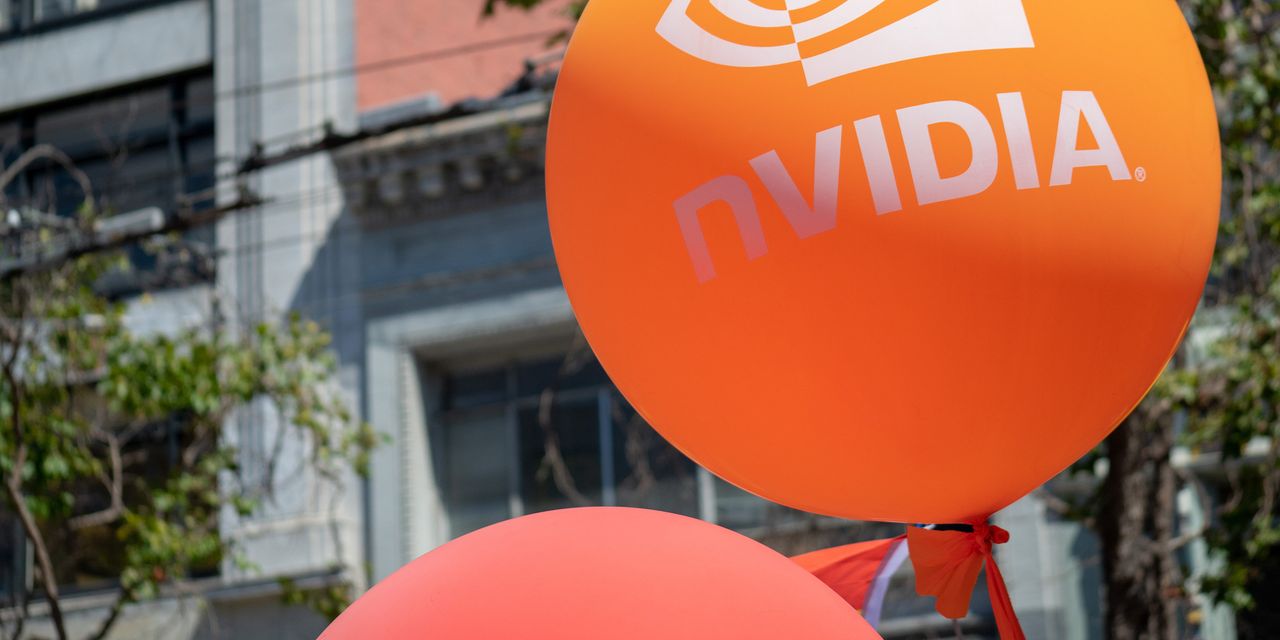When Nvidia Corp. last reported quarterly results, the chip maker forecast record revenue that was far above anything it had put up before. In response, investors sent the stock into orbit. On Wednesday, the latest round of earnings for the company will be a test of Nvidia’s status as the darling of the AI investment boom, and a test of whether it can deliver on its own lofty expectations.
The results will also be an update of tech demand overall, after businesses tightened their IT budgets following worries about an economic slowdown. But even with Nvidia’s
NVDA,
stock up more than 200% so far this year and expectations rising just as much, some analysts still say there’s room for shares to go higher, despite supply-side logjams.
Barclays said that Nvidia, whose chips analysts say will help power AI technology in the days to come, has “monopolized the economics of the AI boom, with no clear competitor close behind.” They added that “cloud capex budgets are being funneled towards AI.”
Signs that Nvidia might be falling behind on meeting chip demand have started to emerge. But as businesses rush to mark their territory, or potential territory, in the world of AI, Wedbush analysts have asked whether Nvidia’s results and forecast would even matter, as today’s production constraints turn into tomorrow’s sales.
“We don’t think NVDA results/guidance need to hit the high end of expectations,” Wedbush analyst Matt Bryson said in a research note on Friday.
“With demand for AI training having lifted substantially in the past quarter and with no other silicon supplier now capable of providing part volumes within an order of magnitude of NVDA’s output, we believe any unfilled demand will just be pushed into forward quarters fueling future sales and (earnings per share),” he continued.
Synovus analyst Daniel Morgan was also bullish on Nvidia’s business targeted toward data centers, as those facilities try to integrate generative AI and large language models. And within Nvidia’s gaming segment, he said the company’s new Ada Lovelace graphics-processing unit ecosystem “appears to be seeing a high level of success in retail.”
Still, the longer a stock runs higher, the harder it can fall. And Nvidia’s $1 trillion valuation, Morgan said, “is not for the faint-hearted.”
This week in earnings
Along with Nvidia, China search giant Baidu Inc.
BIDU,
reports, as the nation’s economic rebound sputters. And if more businesses are still cautious about cloud spending, or shifting spending to AI, the mood could filter through to results from Splunk Inc.
SPLK,
and Snowflake Inc.
SNOW,
Peloton Interactive Inc.
PTON,
Workday Inc.
WDAY,
and Marvell Technology Inc.
MRVL,
also report.
The call to put on your calendar
Zoom and offices: If even Zoom is calling some of its workers back to the office, what could that possibly mean for its results on Monday and the business of videoconferencing? Zoom Video Communications Inc.
ZM,
hasn’t been spared from the wave of tech-industry layoffs, and the company is trying to branch out from its pandemic-mainstay video-call platform, and harnessing its technology to handle phone calls and customer contact centers. Benchmark Research analyst Matthew Harrigan, in a note last week, said he still liked Zoom’s prospects, even though he wasn’t expecting “much instant gratification.” “We do expect AI to crystallize as a significant positive for Zoom even as it navigates through customer pushback on using customer data to train AI models off privacy concerns,” he said.
The numbers to watch
Sales, forecasts and inventories from retailers: Last week, Target Corp.
TGT,
reported what one analyst called “the definition of mixed results,” while another said the results amounted to “Recessionary trends without the recession.” Sales of essentials like groceries, as they have over the past year, helped Walmart Inc.’s
WMT,
results, but management said that consumers were still feeling the pain from inflation, which for some shoppers over the past year has left little room for much beyond the basics.
In the week ahead, we’ll get results whole bunch of retailers that don’t sell basics — like department stores Macy’s Inc.
M,
and Kohl’s Corp.
KSS,
; clothing chains Nordstrom Inc.
JWN,
Gap Inc.
GPS,
Urban Outfitters Inc.
URBN,
; shoe retailer Foot Locker Inc.
FL,
and beauty-products chain Ulta Beauty Inc.
ULTA,
Those retailers will report as prices for some things start to come down, or at least not rise as fast, and as some economists overcome their recession fears. But remarks from executives could offer some sense of the impact from higher borrowing costs and the return of student loan payments, and how much they’ll be able to bank on the back-to-school season and wealthier — and more carefree — consumers.
Dollar-store Dollar Tree Inc.
DLTR,
will also report results, as low-income consumers suffer more under inflation and deal with the end of pandemic-era supplemental food assistance. Off-price retailer Burlington Stores Inc.
BURL,
reports as well, after Ross Stores Inc.
ROST,
Chief Executive Barbara Rentler said that while its low- and moderate-income shoppers were still hurting, shoppers overall “responded well to our improved value offerings throughout our stores.”
Read the full article here



